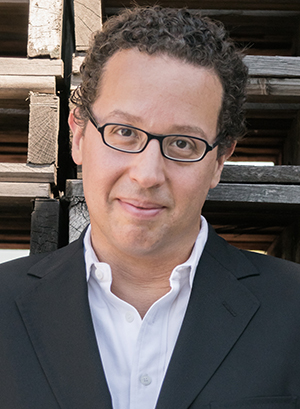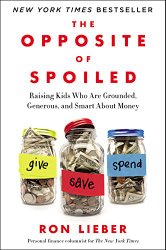By John Lloyd
Ron is the “Your Money” columnist for the New York Times and the author of The Opposite of Spoiled: Raising Kids Who Are Grounded, Generous, and Smart About Money. Speaking at PIA’s annual Fathers Only Forum on March 1st at the Dalton School, he challenged the 150 fathers in attendance to engage their kids about finances as a way of teaching their values. The conversation that followed was lively, with topics ranging from how to handle allowance to how to talk about inheritance.
After an introduction from PIA board member Chris Theodoros, Ron began by telling his own story. When he was young, his family’s financial situation took a turn for the worse. His parents did not shield him from the risks and uncertainties they were all facing, and he was exposed to some financial realities earlier and more starkly than his parents might otherwise have planned.
 This experience led him later in life to start writing about “the intersection of finance and emotions,” first at the Wall Street Journal, and for the last eight years at the New York Times. One thing he has come to realize is that people who are more fortunate are often uncomfortable addressing questions about family finances from their kids.
This experience led him later in life to start writing about “the intersection of finance and emotions,” first at the Wall Street Journal, and for the last eight years at the New York Times. One thing he has come to realize is that people who are more fortunate are often uncomfortable addressing questions about family finances from their kids.
If we asked our own parents about family finances when we were children the answer was probably, “That’s none of your business, ” said Ron, arguing that this is not a very good answer. For one thing, it shuts down an area of curiosity. Do we want our kids to stop asking us about other difficult topics such as sex, drugs, and their emotions? But beyond that, it is also untrue. It is their business, as it has a tremendous impact on their lives.
Engaging your children in an age-appropriate way can be tremendously rewarding. Ron’s favored response to questions from his own kids is: “Why do you ask?” This is not an avoidance technique, but rather a sincere desire to understand where the question is coming from. Often, kids may be grappling with why they have different experiences than some of their friends. Or they may be asking something more fundamental: “Are we okay?”
Ron distinguished between needs and wants. All parents aim to provide their children with what they need; but giving them everything they want isn’t healthy. The more opportunities you can give them to make real choices about what is important to them, the better.
The cover of The Opposite of Spoiled shows a picture of three jars, labeled Spend, Save, and Give. Ron noted that each of these can teach an important lesson in itself and in how it relates to the others.
- Spend: What you spend your money on reflects what you value the most. Helping your children realize this helps them understand your values as well as their own. Ron used an example from his own life: the rain boots his daughter wanted. He and his wife recognized that basic rain boots were a need, but fashionable (and expensive) boots were a want. They decided how much was reasonable to spend and explained to their daughter that if she wanted more expensive boots she would have to pay the difference herself.
- Save: Saving teaches children about patience, an important grown-up skill. Reinforcing the importance of saving when they are young will establish good savings habits they will need when they are independent – which is increasingly important given the proven benefits of beginning to save for retirement while still in your twenties.
- Give: Teach being generous with what is left over. The abstract concept of “giving back” can be hard for children to understand, so help them put it in context. To illustrate why they supported specific charities, Ron and his wife talked to their kids about how their own lives had been changed by the generosity and kindness of others – medical advances that extended their parents’ lives, the scholarships that enabled Ron to complete his education, refugee organizations that helped when his wife’s family first arrived in the United States. And they then let their children make some choices about charitable donations.
The audience remained extremely engaged beyond the official ending time, and Ron generously took questions until our gracious hosts at the Dalton School politely nudged us out the door so they could lock up for the night. Some of the topics raised included:
 Allowance: Going beyond the basic question of how much to give (one rule of thumb might be a dollar a week for each year of their age, divided equally between the three jars), Ron talked about when to introduce it and why it’s important. He believes that it can be a useful tool as early as age five, when children realize the money the Tooth Fairy leaves doesn’t really buy much. As your children get older, before you can decide what amount to give, you have to decide what decisions you want them to be responsible for. Can you get comfortable with giving them more control over their day-to-day decisions and allowing them to make the inevitable mistakes that will teach them to make good decisions? He provided a useful framework for deciding how much to give your kids in general: enough to have some things that they really want but (even if you can afford more) not so much so that they don’t have to make hard choices.
Allowance: Going beyond the basic question of how much to give (one rule of thumb might be a dollar a week for each year of their age, divided equally between the three jars), Ron talked about when to introduce it and why it’s important. He believes that it can be a useful tool as early as age five, when children realize the money the Tooth Fairy leaves doesn’t really buy much. As your children get older, before you can decide what amount to give, you have to decide what decisions you want them to be responsible for. Can you get comfortable with giving them more control over their day-to-day decisions and allowing them to make the inevitable mistakes that will teach them to make good decisions? He provided a useful framework for deciding how much to give your kids in general: enough to have some things that they really want but (even if you can afford more) not so much so that they don’t have to make hard choices.
Chores and work: Ron believes that chores should not be tied to allowance. Pitching in to help the family is not optional, and you don’t want to be in the position where children can decline to do their chores because they don’t need the money. After watching the program Master Chef Junior with their daughter, she said, “I can do that,” so they gave her a few basic lessons and then gave her the responsibility of helping prepare dinner from an early age.
Peer groups and wealth: Ron talked about the impact of social media, which he called an “engine for envy.” Kids are pressured to exhibit only the most impressive aspects of their lives – “look at my awesome,” as he put it. Help your kids understand that flaunting their advantages isn’t necessary and can be embarrassing. This message is of specific interest to the parents of children in Independent Schools, he said, as they are often surrounded by less socio-economic diversity than exists in the larger world. Restraint is not driven only by what you can afford.
Difficult questions: One father described a situation where his child was late for school and asked, “Why won’t you give me money for a taxi, when I know you spend more money than that on yourself all the time?” Ron’s advice was to let the child be late for school. We shouldn’t be protecting our children from the consequences of their actions.
Disclosing salary and wealth: Younger children, even young high schoolers, are probably not ready to know the details of your family’s finances. But Ron argues that it can be very valuable for your high school senior or college student to understand how much money your family has, and what it cost to raise them. That helps them to understand what to expect from their own lives, especially since most of them will live in less comfortable circumstances as they begin their own careers. They will be mature enough at that point to understand that this is family information that is not to be shared with others – especially if you have spent the years leading up to this engaging them and developing their financial maturity.
Inheritance: Audience members asked Ron how to handle talking about inheritance, and how expectations of inheritance might skew a child’s perspective and motivations. Ron felt that you should tell your children bluntly not to count on any inheritance. This should be combined with the message that they don’t need to define happiness in financial or lifestyle terms. “You don’t need all of this to achieve the happiness that we hope you will achieve.”
Ron’s fundamental message was that we should all be investing in our relationship with our children, using all the tools we have at hand to teach them our values. If your child asks you uncomfortable questions about money, Ron’s advice is to “seize those moments. Your family will be richer for it.”
